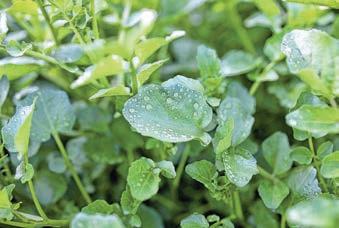
1 minute read
Watercress Can Improve Mental Heath

Mental health and nutrition are reciprocal. What people eat affects their mental health, and mental health influences how they think, feel, and act. The latest American Medical Association poll shows that 66 percent of American adults understand the connection, and 81 percent are inclined to improve their diet to improve mental health.
Advertisement
Americans agree that work (70 percent), family stress (68 percent), exercise (65 percent), and social habits (61 percent) have a more of an impact on their mental health compared to their diet (58 percent). But, they agree that their diet (58 percent) substantially impacts their mental health.
Improve your diet with the most nutrient-dense food on the planet—watercress. Watercress is packed with 28 essential vitamins, minerals, and compounds and is the only food to obtain a perfect score on both the Aggregate Nutrient Density Index (ANDI) and Centers for Disease Control (CDC) indexes.
Watercress also scores high on the Antidepressant Food Scale because it is a source of highly soluble iron, zinc, magnesium, and Vitamin B. These nutrients are related to preventing and treating depressive disorders.
Watercress is packed with 28 essential vitamins, minerals, and compounds—all these nutrients are related to preventing and treating depressive disorders.
The signs of mental health struggles include a change in eating habits, insomnia, changes in energy levels, shying away from others, unexplained moodswings, unable to perform daily tasks, considering self-harm, and indulging in alcohol or other substances more than usual.
Several circumstances can affect mental health, but there are ways to help reduce suffering and the chance of onset. Incorporating a healthier diet is a simple way to start.
—B&W Quality Growers









